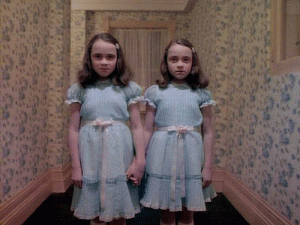 Dalia, at the age of 3 years and 10 months, now has imaginary friends.
Dalia, at the age of 3 years and 10 months, now has imaginary friends.
DadWagon reader, meet Wawa and Zoë. I believe they are standing just behind your left shoulder.
Okay, now that you’ve met, let’s talk about the Most Celebrated Imaginary Friend of the Last Decade, Charlie Ravioli. Adam Gopnick wrote about him in a 2002 New Yorker article:
“My daughter Olivia, who just turned three, has an imaginary friend whose name is Charlie Ravioli. Olivia is growing up in Manhattan, and so Charlie Ravioli has a lot of local traits: he lives in an apartment “on Madison and Lexington,” he dines on grilled chicken, fruit, and water, and, having reached the age of seven and a half, he feels, or is thought, “old.” But the most peculiarly local thing about Olivia’s imaginary playmate is this: he is always too busy to play with her. She holds her toy cell phone up to her ear, and we hear her talk into it: “Ravioli? It’s Olivia . . . It’s Olivia. Come and play? O.K. Call me. Bye.”
Ravioli was nominated for an Ellie award. He became the subject of sermons. I’ve always been a little suspicious of how complete and well-articulated the imaginary life of his barely 3-year-old daughter was, but then again, Gopnik is “full of wisdom and elegance”, so perhaps his daughter is equally precocious.
What Gopnik really taught me, though, is to look for the meaning behind the imaginary friends. And in this regard, I, like Gopnik, am a little troubled.
First, there’s the issue of baby-hate: one of the friends likes babies (Zoë), but the other hates them and, we are told, wants to push Dalia’s little brother Nico (Wawa). It feels like a bit of a set-up, as if one day we will find Nico stuffed in the trash can and Dalia will only have to say that she warned us that Wawa didn’t like babies.
I am a bit uneasier, however, about this: Wawa and Zoë keep dying.
If Charlie Ravioli doesn’t have time for Olivia because he’s busy, Wawa often can’t come because she was just killed. Dalia usually can’t say how Wawa died, but I have a feeling that Wawa died in a traffic accident on her motorcycle, because that’s how my uncle, whom Dalia knew well enough, died in August.
The conversation I had with Dalia after the accident was difficult. Kid logic just strips everything down to its most naked and unbearable: Where did he go? Is he coming back? Why not? Why did he have to die? I had no good answers, for her or for myself. It was miserable.
I worried for a while that all this talk of death would traumatize her. But then I spoke to a friend of mine in Seattle who had lost her brother earlier this year. She also has a daughter Dalia’s age, and she told me a perfect little story about death and preschoolers: on a walk down some leafy Seattle street, she had tried to explain to her daughter why Uncle Adam wasn’t coming back. She pointed to an old tree that had fallen over.
“See,” she told her daughter, “Adam is like that tree. When something dies, it doesn’t come back. You can’t talk to it anymore, or see it. It’s just gone.”
They walked in silence for a block or two, until the daughter turned to her mom and announced that she was sad.
“I know,” the mom said. “I really miss Uncle Adam, too”
“Actually,” said the 3-year-old, “I’m sad about that tree.”
That’s the beautiful thing about kids. Those little brains are so good at coping. They can parcel out the big hurts in small packages. They worry about a dead tree. They have a pair of imaginary friends who are killed in the morning but come back to play after nap. As 2Pac said–and he would have to know–Life Goes On:

Great piece